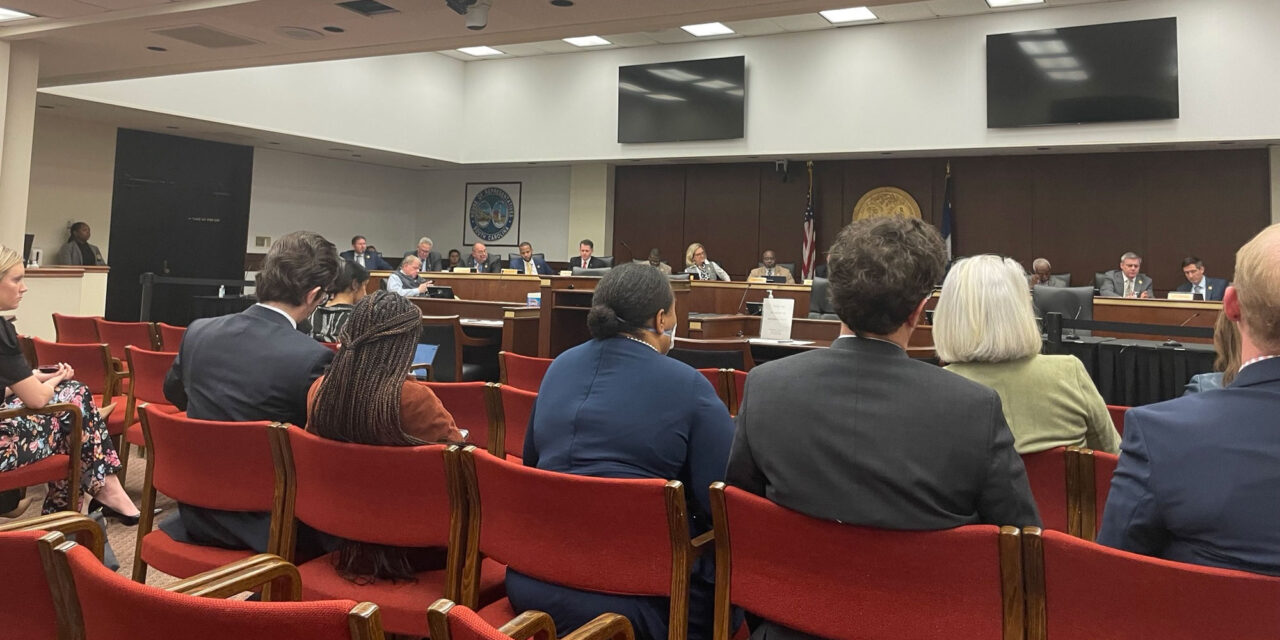The House Education and Public Works Meeting that was held on Tuesday afternoon. The bill was passed to the House of Representatives after a 12-5 vote. (Photo by Taylor Beltz)
A controversial bill that would restrict how race is discussed in South Carolina schools is one step closer to being passed into law.
The bill approved by the full House education committee Tuesday lays out restrictions on what can be taught in classrooms while protecting “fact-based discussions of controversial aspects of history.”
“As an educator, I will tell you that this bill is strong in requiring fact-based education,” said Rep. Shannon S. Erickson, R-Beaufort, during the House Education and Public Works Committee meeting. “As an educator, my job is to impart knowledge, not my opinion.”
These restrictions include teaching that one race is inherently better than another. It also prohibits teaching that “an individual, by virtue of the race, sex, ethnicity, religion, color, or national origin of the individual, inherently is privileged, racist, sexist, or oppressive, whether consciously or subconsciously.”
Dr. Christian Anderson, an associate professor at the University of South Carolina, called the bill “counterproductive” and “unnecessary.”
Kourtney O’Hara, chair of the Lexington chapter of Moms for Liberty, said it supports the bill because it allows for more transparency between teachers and parents. Moms for Liberty is a conservative group that advocates for parental rights in schools and is best known nationally for advocating the banning of some books in schools.
“We’re all about transparency and integrity,” O’Hara said. “We don’t want any child to feel like there’s a personal bias on them based off of their skin color.”
Steven Nuzum, a board member of SC for Ed, a teacher advocacy group, said it opposes the bill because it seems to distrust educators.
“They’re probably going to argue, ‘We’re not trying to go after schools. We’re not trying to go after teachers,'” Nuzum said. “But they’ve already used some of the language that’s in the bill to specifically go after schools.”
Education bills such as this one have been introduced across the United States with a variety of new parameters for curriculum content, often specifically targeting the teaching of Critical Race Theory.
“In Florida, Gov. (Ron) DeSantis just declared that AP African American History was illegal,” Rep. Kambrell Garvin, D-Lexington, told the committee meeting Tuesday. “In New Hampshire, a group offered a $500 bounty for people who turned in teachers for violating their classroom budget. So I share those examples, members of the committee, to say that I think we’re on a slippery slope.”
Garvin went on to voice his opposition for the bill, although it still was sent to the House after a 12-5 vote.
A reporting system was also introduced for handling violations.
O’Hara said having an avenue to report these violations gives parents more of a say in their children’s education.
“A lot of parents haven’t felt like their voices have been heard for so long that I think this could really be a way to kind of bridge that trust,” O’Hara said. “If I come to you with a concern or a question of clarity, I know I’m going to hear back.”
Patrick Kelly, the director of government affairs for the Palmetto State Teachers Association, called the reporting system a “double edged sword.”
He said that while the bill puts in place a more consistent system for reporting – which in part keeps teachers’ names confidential – he is worried it can be “weaponized by an individual to really put an undue burden on teachers.”
SC for Ed’s Nuzum said more energy could be spent on issues that directly affect teachers.
“Any time that resources are being spent on these kinds of things are just time and resources that legislature is not spending on things like improving teacher working conditions or improving mental health for students, or mental health services for students, or making school buildings safer, improving facilities or any of the things that teachers have been asking for,” Nuzum said.



